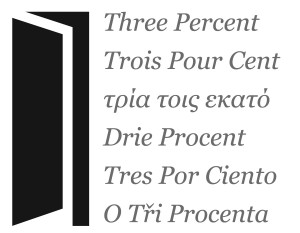UR’s literary publishing house, Open Letter Books, recently released an ebook titled “The Three Percent Problem: Rants and Responses on Publishing, Translating, and the Future of Reading” in celebration of the four year anniversary of Three Percent, the publishing house’s literary commentary website.
“[‘The Three Percent Problem’] is sort of like Andre Schiffrin’s ‘The Business of Books’ but with more swearing,” Open Letter Publisher Chad Post said.
The book explores the state of contemporary book culture with respect to publishers, book reviews, bookstores and ebooks. It is focused mainly on how things could change for the better — specifically how there could be an increase in the publication of international literature.
“The Three Percent Problem” is an anthology of articles that examines the financial and cultural reasons that fewer than three percent of books published in America are translated from other countries. The ebook also features an exploration of publishing scenes in different countries, profiles of contemporary translators and “mini-rants” about book marketing, $0.99 ebooks and technology.
The Three Percent website serves as a destination for readers, editors and translators interested in following the development of modern and contemporary international literature, which is furthered in “The Three Percent Problem.”
Post had an integral part in the planning and development of the book, and was responsible for writing all of the pieces included in the ebook.
“Our goal is to raise awareness about the state of literature in translation and convey our passion about books,” he said. “I hope ‘The Three Percent Problem’ does just that.”
Three Percent intern and sophomore Taylor McCabe, who also played a significant role in the development of this ebook, views the publication as an accessible gateway into the world of publishing. “The book is a funny, readable, interesting series of essays on the state of translation and international publishing today, interspersed with truly hilarious rants about the struggles of working in translation,” McCabe said.
According to several literary translators — who are often overlooked and undervalued by the publishing industry — “The Three Percent Problem” accomplishes the goals that Post and McCabe strived for during the publishing process.
“Translators benefit in a general way from [this] book, because it helps them understand the industry and climate in which they are working,” self-employed literary translator Marian Schwartz said. “Limited understanding of what publishers do and how the business works seems to be a major practical hindrance for many translators.”
Jeffery Angles, Associate Professor of Japanese Literature & Translation Studies at Western Michigan University, also sees how “The Three Percent Problem” is a guide for literary translators and the future of their field. “[The book] helps us understand where we — the small guys sitting at our desks and working on our nitty-gritty translation problems — fit into a larger, world-wide industry,” he said.
He explained how translators often cannot have adequate insider access to decisions about the translation process and discussed indifferent publishers who have no interest in reading works written by authors with foreign names.
All of the proceeds from “The Three Percent Problem” will go toward financing the work of literary translators.
Berkowitz is a member of the class of 2012.



